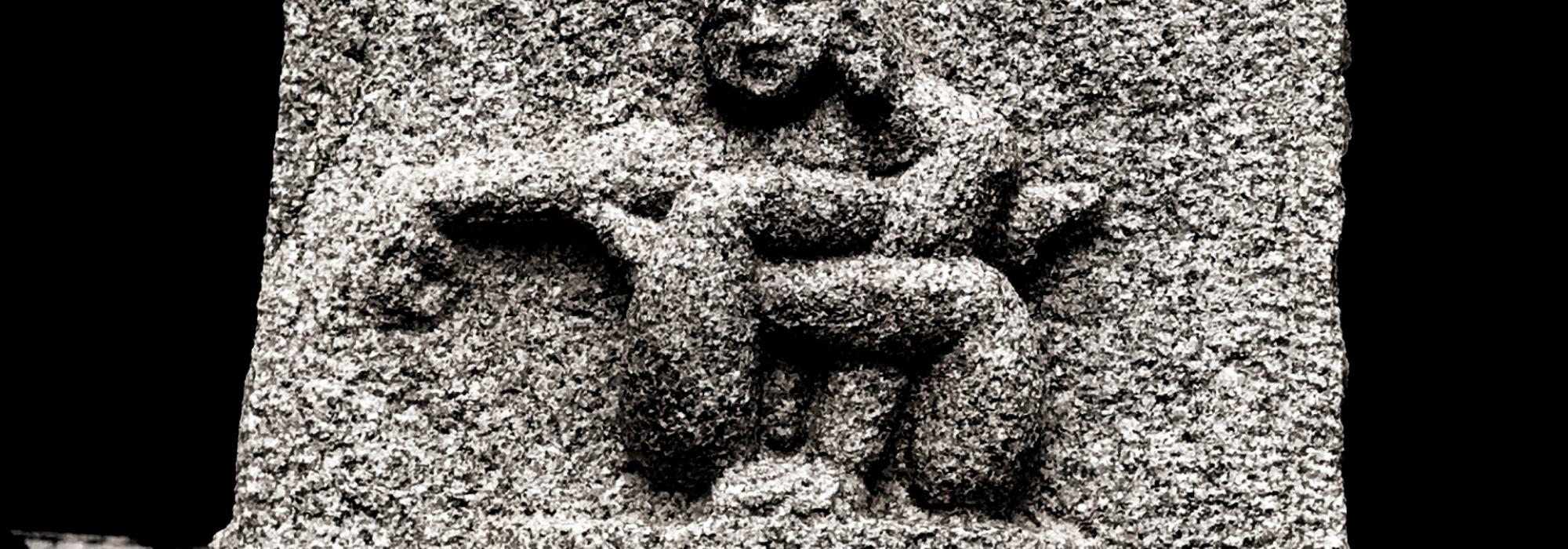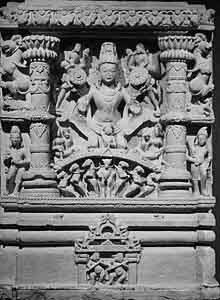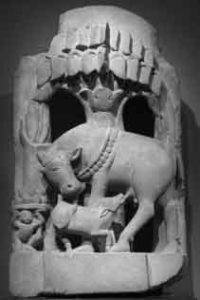[The following sub-stories appear in the Ādi Parva of the Mahābhārata, Adhyāyas 158–74] The brave Pāṇḍavas travelled day and night and arrived at a holy place called Somaśravāyaṇam. Arjuna, the bravest among them all, carried a fire-stick to light their path and also as a means of protection. In an isolated corner of the Gaṅgā, the king of the Gandharvas was engaged in water-sports with several women. He heard the Pāṇḍavas approaching and was enraged. He stopped them and said, “When the sun has set and the night is yet to begin, when the evening is deep red, the time is reserved for Yakṣas, Gandharvas, and Rākṣasas. We do not spare anyone who disturbs our privacy during these hours, even if the person is a great king. Stop! Wait at a distance! How could you not know that I’m playing here in the Gaṅgā? I’m a close friend of Kubera and my name is Aṅgāraparṇa. I live in this forest called Aṅgāraparṇa, which lies close to the rivers Gaṅgā and Vākā. No one dares to come here. Why have you come?” Arjuna replied, “O fool! Who has given you the right over these regions of the Gaṅgā and the valleys of Himālayas? No one can stop us from entering the region!” This angered the Gandharva and he shot poisonous arrows at the Pāṇḍavas. Arjuna warded off the arrows by using the antelope skin he was wearing and the fire-stick he was carrying. Arjuna said, “I know that the Gandharvas are superior to humans. So I shall resort to using divine arrows but I won’t use any magic. Here is the Āgneyāstra that was given to my guru Droṇa.” Arjuna shot the arrow and it burned down the Gandharva’s chariot, forcing him on to the ground. Arjuna brought the unconscious Gandharva to his brothers, dragging him by the hair. The Gandharva’s wife, aghast, came to Yudhiṣṭhira asking him to let her husband go. She said, “Please protect me, O Yudhiṣṭhira! I am Kumbhīnasī, the helpless wife of the Gandharva.” Yudhiṣṭhira instructed Arjuna to let the Gandharva go. The Gandharva said, “As I have lost to you, Arjuna, I shall give up the name Aṅgāraparṇa. I was also called Citraratha since I possessed a special chariot. Now that it is burnt, I am a ‘dagdharatha’! In the past, I had acquired a special skill called ‘Cākṣuṣī’ due to immense tapas. Now I shall pass it on to you because you have saved my life. A person who possesses this skill can see anything he wishes to see in the three worlds. To acquire this skill, one should perform tapas, standing on a single foot for six months. I’m giving this to you, assuming that you’ve performed such austerities. I shall gift you and your brothers a hundred horses each. They travel at the speed of the mind.” Arjuna thanked him and said, “Gandharva! Are you giving this out of your affection for us or because your end is nearing? If it is the latter, I shall not receive the Cākṣuṣī skill and the horses.” The Gandharva said, “I’m doing this only as a token of affection. In turn, I request you to teach me the usage of Āgneyāstra.” Arjuna agreed to the proposal and said, “We shall be friends forever! Dear friend, let us know how we can overcome the fear we have of you all [the demi-gods]. Pray tell us why you stopped us here.” The Gandharva replied, “Neither do you practice agnihotra nor do you perform the āhutis. You came here without brāhmaṇas. I thus stopped you! Arjuna, I’ve heard about the valour of your ancestors from Nārada and other sages. I’ve also seen the glory of your dynasty during my travels. I’m a powerful warrior but I was unable to take the insult I faced while in the company of women. So I stopped you. The strength of the Gandharvas increases at night; I got enraged as you were intruding my privacy while I was in the company of my wives.’ The Gandharva then described how Arjuna won over him in the battle. He also told him how it is important for a kṣatriya to have a purohita – a brāhmaṇa who will guide him in the path of dharma and it is only with such a person’s guidance will a king be able to rule over the lands for a long time.
Arjuna then asked the Gandharva, “You have addressed me as ‘Tāpatya’ in your conversation. Pray tell me why you did so. Why are we called Tāpatyas? Who is this lady called Tapatī?” The Gandharva began narrating the story. “Sūrya, who has the skies as his abode, had a beautiful daughter called Tapatī. She was the sister of Sāvitrī. As she performed great tapas, she came to be called Tapatī in the three worlds. Sūrya wanted to get her married to a suitable groom and was looking for one. At the same time, there lived a king by name Saṃvaraṇa, the son of Ṛkṣa who belonged to the Bharata clan. He regularly offered oblations to Sūrya and had great reverence for him. Sūrya thought that he would be an appropriate match for his daughter. Just as Sūrya ruled the skies with his brilliance, Saṃvaraṇa ruled the earth with his brilliance. Once, King Saṃvaraṇa was out hunting in a forest when his horse died of tiredness. He continued roaming in the hills on foot, when he saw a girl with large eyes. He stared at the girl and felt that his eyes had found fulfilment. He lost all interest in hunting and at once fell in love with her. Even as he went ahead, trying to strike a conversation with her and express his love, the beautiful lady Tapatī vanished just as lightning disappears in the clouds. The king was heartbroken and fell to the ground. Soon after, Tapatī appeared before him again. The love-struck king begged her in various ways to marry him. He even proposed to marry her in the Gāndharva manner. She said that she was under the care of her father and only with his permission could she marry him. She said, “If my father wishes to get me married to you, I shall be delighted. Who would not want to marry an emperor? O king, I am the daughter of Sūrya and my name is Tapatī”. Having said so, she disappeared into the skies again and Saṃvaraṇa fell to the ground. After some time, the king’s minister and servants discovered him; he had fallen on the ground like an Indradhvaja. They got him water and brought him back to consciousness. The minster, who was much older to the king and a fatherly figure to him, remained with the king while the rest of his people left as per the king’s orders. The king decided to perform tapas to invoke Sūrya and stood with his hands joined and arms stretched up. He thought of the great sage Vasiṣṭha as he performed the tapas. After the king had performed arduous tapas for twelve days, Vasiṣṭha appeared there. The sage, with his divine powers, found out the reason for the king’s desire. He spoke to the king and left immediately to meet Sūrya.
The sage went to Sūrya of a million rays with folded hands and said, “I am Vasiṣṭha.” Sūrya said, “You are welcome, revered sage, please tell me what you want.” Vasiṣṭha requested him to offer his daughter Tapatī in marriage to King Saṃvaraṇa. Sūrya gladly agreed and handed over his daughter to the sage, who in turn brought her to the king. In this manner, due to his intense tapas, Saṃvaraṇa won over Tapatī with the assistance of Vasiṣṭha. He married the maiden in a traditional manner. The king gave the responsibility of the kingdom to his ministers and stayed back in the forest with his beloved. He spent twelve years in the forest, enjoying his time playing water-sports with his wife. Indra, the deity of rains, did not shower rains in Saṃvaraṇa’s kingdom for twelve years. The land was filled with people who were starving and it looked like a kingdom of ghosts. Looking at the condition of the people, Vasiṣṭha approached the king. In deference to the sage’s words, the king returned to his kingdom with his wife and the people rejoiced his return. Peace and rains were restored in the kingdom. Saṃvaraṇa gave birth to a son named Kuru from his wife Tapatī. Arjuna was thrilled upon hearing the story. He requested Citraratha to tell him more about Vasiṣṭha. The Gandharva said, “Vasiṣṭha was a great sage who had won over desire and anger through tapas. This is something that even the deities haven’t been able to do. The sage did not resort to any harsh deeds nor did he give free vent to his anger even when he faced the insolence of Kauśika. Though he was capable of bringing his children back to life, he never did so, for he had great reverence for the dharma set by Yama. He was the spiritual advisor to the kings of Ikṣvāku’s lineage and they were able to conquer great lands. Having him as their purohita, the Ikṣvāku kings performed several yajñas. Thus I advise you to procure a capable purohita, who will guide you in administering a kingdom. A person who is born a kṣatriya and would like to rule a kingdom should have an able purohita. Arjuna then asked the Gandharva the reason behind the fight between Viśvāmitra [previously called Kauśika] and Vasiṣṭha. The Gandharva then started narrating the following story – There lived a king named Gādhi in Kānjakubja and he had a valorous son named Viśvāmitra. Once, he set out on hunting and after a while, to relieve of his tiredness, he came to Sage Vasiṣṭha’s āśrama. The sage welcomed him with great respect and was a great host. He called his pet cow Kāmadhenu and instructed her to give everything that Viśvāmitra desired. The cow, with its divine powers, manifested great amounts of tasty food and fed the king and his retinue with a sumptuous meal. The king was greatly impressed and asked the sage to give him the divine cow in exchange for ten crore cows or his entire kingdom. Vasiṣṭha turned down the king’s offer; the enraged king tried taking away the cow by force. The king’s men beat the cow with whips and sticks and the cow faltered around in pain, calling out ‘Hambā!’ The cow did not leave the āśrama though it was inflicted with so much of pain. Kāmadhenu came to Vasiṣṭha and said, “You see the king’s men ill-treating me. You see me calling out in pain, like an orphan. Yet why do you ignore me?”
The sage did not abandon his serenity and said, “O revered one, valour adorns a kṣatriya and peace is a brāhmaṇa’s strength.” The cow then took a ferocious form, gave out a loud cry, and created a huge army that overpowered the king’s men. Looking at the brilliance of the power of brāhma, Viśvāmitra felt disgusted with his kṣātra dharma. He declared, “Fie upon kṣātra! The strength of a brāhmaṇa is the real strength. Tapas is the greatest power. He gave up his kingdom and performed a great penance. He attained great siddhis thanks to his tapas and attained the status of a brāhmaṇa. The Gandharva also told them the story of how Vasiṣṭha retained his calm even when all his children were killed. He further told him the story of Parāśara’s birth and the aurvāgni (the fire within the oceans). Upon listening to these stories, Arjuna and the Pāṇḍavas realised the importance of having a purohita to guide them. Arjuna requested the Gandharva to suggest a brāhmaṇa who had mastered the Vedas and would be suitable to serve as their purohita. The Gandharva then said that a sage named Dhaumya, the brother of Devala was performing tapas in a place named Utkoca and that they could approach him with their request. Arjuna thanked him and taught him the usage of the Āgneyāstra. He also told the Gandharva that the horses may remain with him and that they would take it from him when necessary. They bid farewell to him and went ahead to Utkoca. There they met Dhaumya, who graciously accepted to be their purohita. He became their guru. Dhaumya felt that the Pāṇḍavas were pious and could perform yāgas under his guidance. The Pāṇḍavas too became confident that they would win back their kingdom with his support. They sought blessings from him and headed towards Pāñcāla for the svayaṃvara.
To be continued…
This special episode forms a part of the serialized English translation of Prof. A R Krishna Shastri’s Kannada classic Vacanabhārata by Arjun Bharadwaj and Hari Ravikumar. This episode has been translated directly from the Critical Text of the Mahābhārata and does not appear in Prof. Krishna Shastri's book.














































